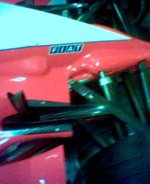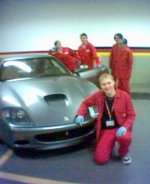Probably discussion of optimax to follow, it was very interesting and I DID ASK! *clap*
Ok, marketing speak guy:
I was the last question, "So, do you feel that the cost premium of optimax means it's worth it in a car without a knock sensor"
Basically boiled down to "our customers say so", fair enough, he wasn't a huge techie. He also said that "It would be up to the individual to find out if they THOUGHT they got an advantage from it"
Then we went down to the car testing labs, this included the Ferrari F1 car, F550 (build quality was awful!), 4 other cars in their on rolling roads (they own 20 of them etc. etc.) inclunding a dual fuel Mondeo (2 cylinders on fuel A, 2 cylinders on fuel B) a A4 (benchtested engine, not sure what they were doing) and a Vectra on dyno with loads of fancy tools including choice of 3 fuels that could be selected. They have 250 cars aswell to do their testing on!! 250!!
Basically when the main tester had a minute we did a 30-60 run in the vectra in 4th uphill on the dyno, good fun, optimax had it but by 3metres over 340 or whatever it was lol. I went into details of optimax and liked my interest, he immediately took me to see the dual fueled mondeo and the difference in valves with a pin hole camera, optimax was cleaner. I asked him, is there any point with optimax in a car without a knock sensor, his basic answer was "No, nothing quantifiable, the cleaning affects might do something but that never had showed up on their extensive testing in terms of proper advantage. he told me all their data was done on newer cars with knock sensors and if he drove a car without a knock sensor he wouldn't consider optimax - most interesting.
All of the literature on Optimax that we were given was VERY careful in saying what advantages. He also said the target audience were people of newer and turbo'ed cars.
Firstly, this is the F1 car we played about with (including changing the wheel)
Then there's the F550 ( i was told) we got to rev a bit
Ok, marketing speak guy:
I was the last question, "So, do you feel that the cost premium of optimax means it's worth it in a car without a knock sensor"
Basically boiled down to "our customers say so", fair enough, he wasn't a huge techie. He also said that "It would be up to the individual to find out if they THOUGHT they got an advantage from it"
Then we went down to the car testing labs, this included the Ferrari F1 car, F550 (build quality was awful!), 4 other cars in their on rolling roads (they own 20 of them etc. etc.) inclunding a dual fuel Mondeo (2 cylinders on fuel A, 2 cylinders on fuel B) a A4 (benchtested engine, not sure what they were doing) and a Vectra on dyno with loads of fancy tools including choice of 3 fuels that could be selected. They have 250 cars aswell to do their testing on!! 250!!
Basically when the main tester had a minute we did a 30-60 run in the vectra in 4th uphill on the dyno, good fun, optimax had it but by 3metres over 340 or whatever it was lol. I went into details of optimax and liked my interest, he immediately took me to see the dual fueled mondeo and the difference in valves with a pin hole camera, optimax was cleaner. I asked him, is there any point with optimax in a car without a knock sensor, his basic answer was "No, nothing quantifiable, the cleaning affects might do something but that never had showed up on their extensive testing in terms of proper advantage. he told me all their data was done on newer cars with knock sensors and if he drove a car without a knock sensor he wouldn't consider optimax - most interesting.
All of the literature on Optimax that we were given was VERY careful in saying what advantages. He also said the target audience were people of newer and turbo'ed cars.
Firstly, this is the F1 car we played about with (including changing the wheel)
Then there's the F550 ( i was told) we got to rev a bit
Attachments
Last edited:





